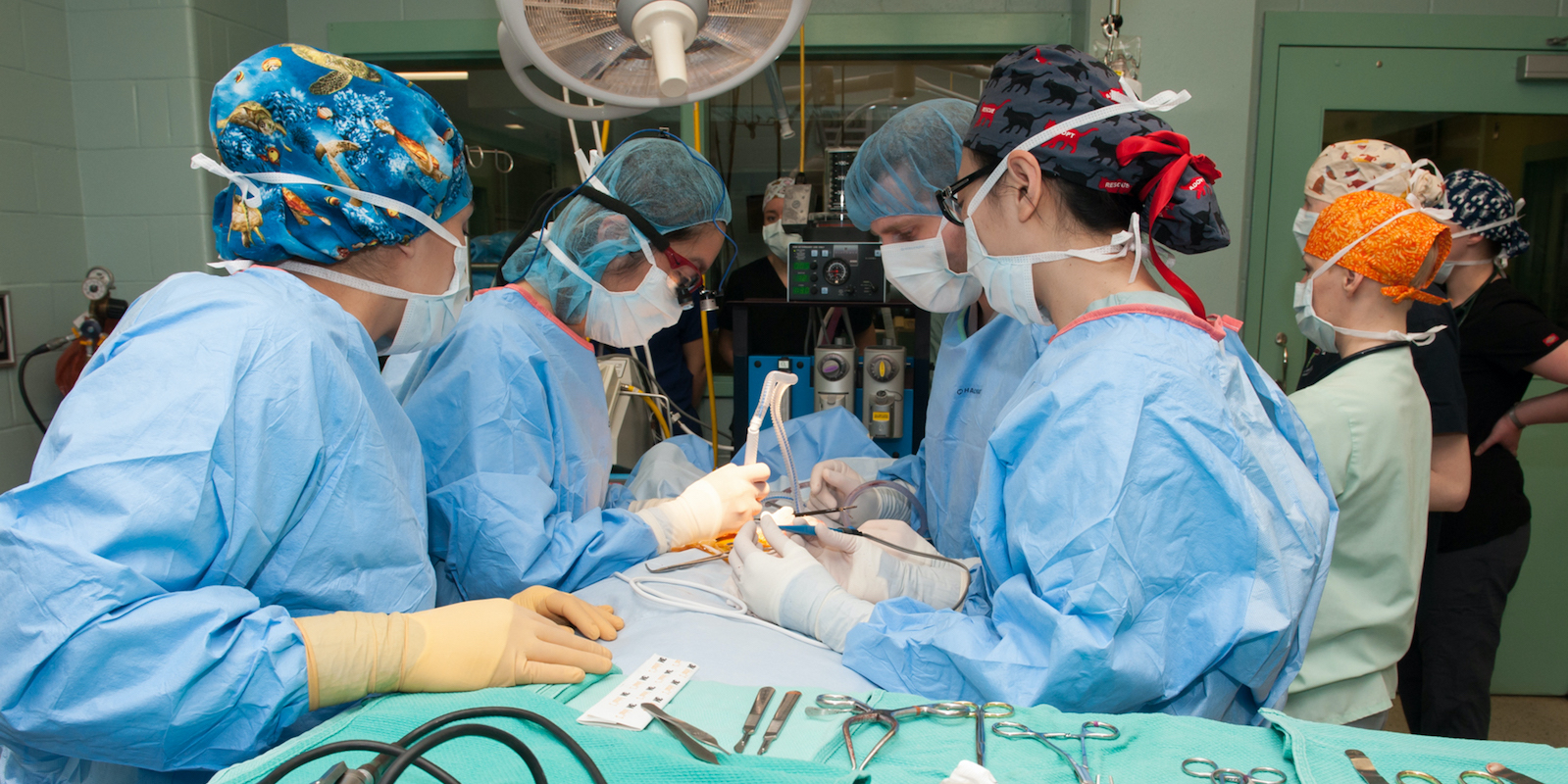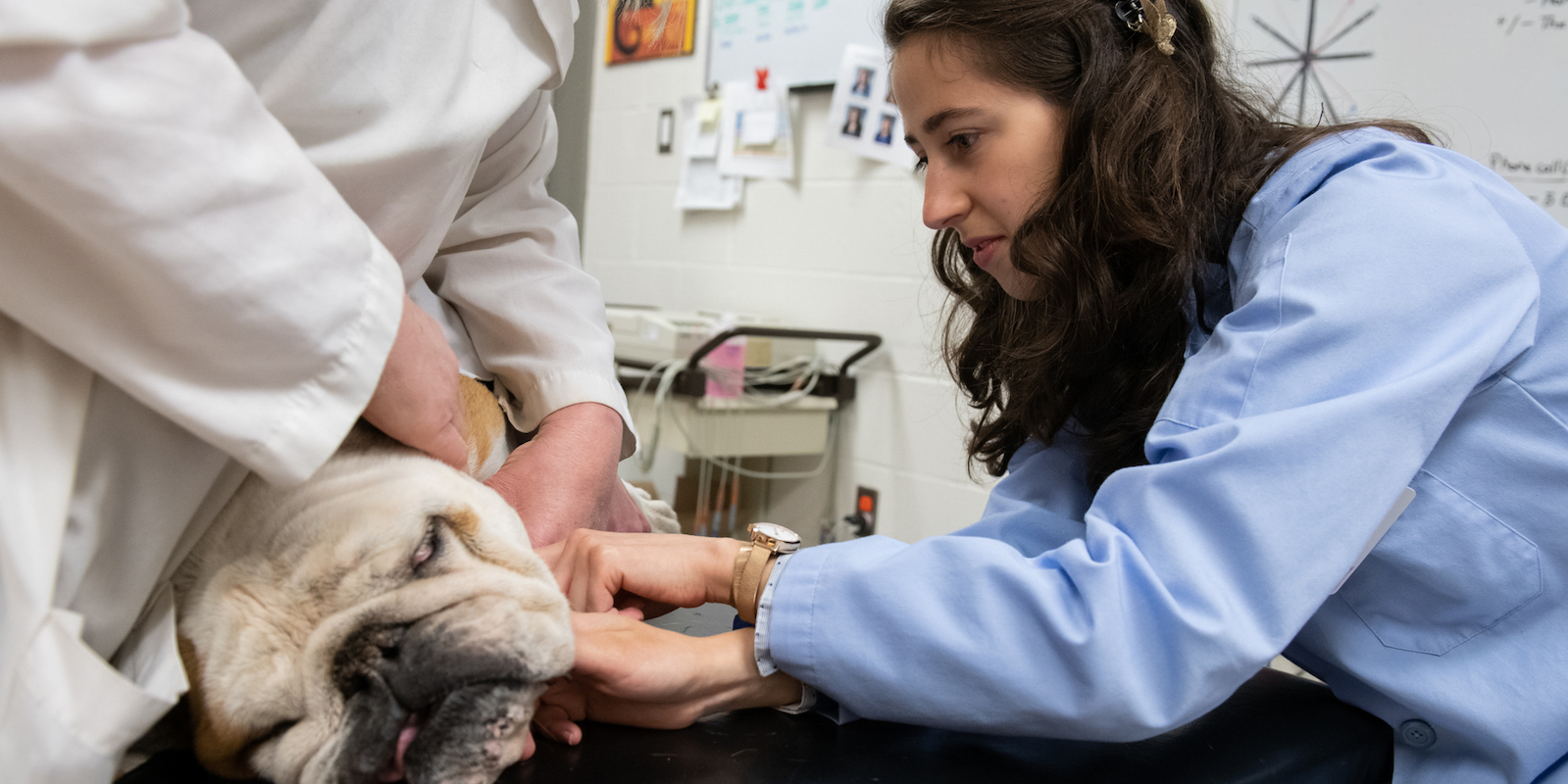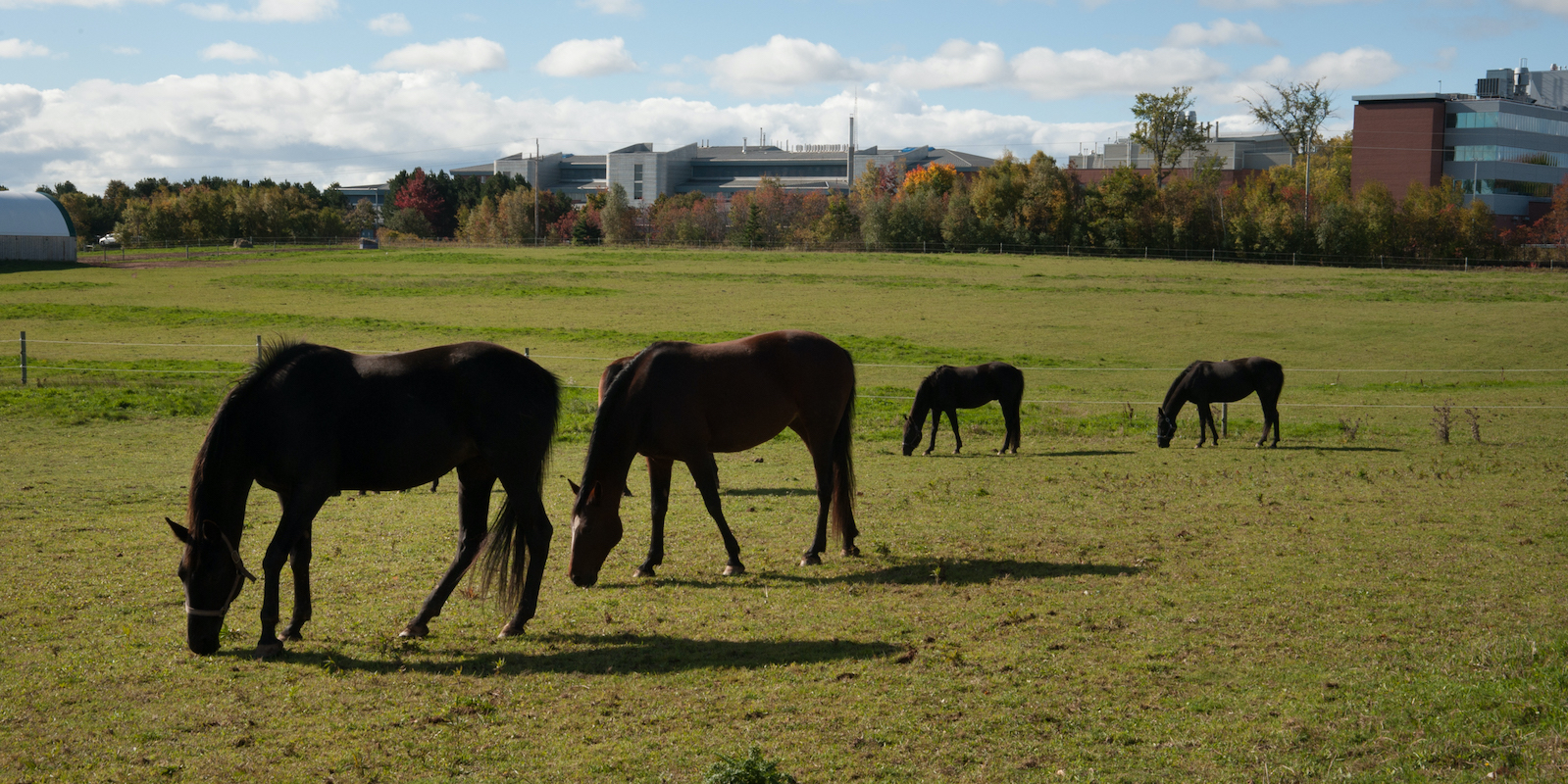
The Application Portal for the DVM program will open on October 1, 2024, with an application deadline of November 15, 2024.
This delay in the regional application cycle is necessary to allow for coordinated efforts with the Atlantic Provinces under the Interprovincial Funding Agreement.
Selection criteria used in previous years will remain applicable in the 2024–2025 application cycle.
Additional information will be provided on September 25, 2024.
Beginning in the 2020-2021 admissions cycle and beyond, the Graduate Record Examination (GRE) will no longer be a requirement for application to the DVM program. Academic achievement will be based on performance in prerequisite coursework only.
Beginning in the 2020-2021 admissions cycle and beyond, prerequisite coursework completed within ten (10) years of the date of application to the DVM program will be considered acceptable.
Due to changes in grade reporting arising from COVID-19 disruptions to education during 2020, decisions regarding adoption of Pass/Fail or other similar grading conventions will be respected whether those decisions were made by institutions or by individual students. When calculating the academic average involving coursework taken during this period of disruption, every effort will be made to give full advantage to each individual applicant.
As a regional veterinary college, the AVC accepts applicants who are residents of Prince Edward Island, Nova Scotia, New Brunswick, and Newfoundland and Labrador. In addition, non-Canadians may apply to our international applicant pool.

If you are a Canadian citizen or permanent resident, you must meet the residency requirements for one of the four Atlantic Canadian provinces (Prince Edward Island, Nova Scotia, New Brunswick, or Newfoundland and Labrador) in order to apply for a regional DVM seat. Atlantic Canadian residency requirements are defined by the Maritime Provinces Higher Education Commission (MPHEC). Determination of the province of residency is a two-step process:
1. Determine if you are an independent or dependent student according to the criteria given below:
You are an independent student if you meet ANY of the following criteria:
Once a student has met the criteria to be an independent student, he/she will remain an independent student for the purposes of residency determination.
You are a dependent student if you do not meet at least one of the criteria to be an independent student listed above.
2. Provide information about your address or your parents’/guardians’ address according to the criteria below:
To facilitate determination of residency, all Atlantic Canadian applicants will be required to submit the following documents:
In addition, dependent Atlantic Canadian students must also provide the following additional document:
A “full-time student” is defined as having a course load of at least three courses (nine semester hours of credit) per semester, excluding laboratories.
A “post-secondary institution” is defined as an institution authorized to confer post-secondary certificates, diplomas, or degrees.
A resident of the Province is an individual lawfully entitled to be or remain in Canada, who makes his or her home and is ordinarily present in New Brunswick/Nova Scotia/Prince Edward Island/Newfoundland for twelve consecutive months prior to the student’s request for admission, including a student living out of Province for the purpose of furthering his or her education, but not including a tourist, transient or visitor to the Province.
Independent students
An independent student meets, at minimum, one of the following criteria:
An independent student is considered a resident of New Brunswick/Nova Scotia/Prince Edward Island/Newfoundland by living in the Province for twelve consecutive months prior to the student’s request for admission, excluding time spent as a full-time student at a post-secondary institution.
Dependent students
A dependent student is a student who does not meet any of the criteria of an independent student. A dependent student is considered a resident of New Brunswick/Nova Scotia/Prince Edward Island/Newfoundland whose parents, guardian or sponsors resided in the Province for twelve consecutive months prior to the student’s request for admission:
** Independent or dependent student status is determined by an individual’s status at the time of the start of the academic program for which they are applying.
*** MPHEC has made the following clarification in regards to students moving from dependent to independent student status;
Once a student has established residency in an Atlantic province as a dependent student, they maintain residency in that province when they become an independent student as long as they have not lived for 12 consecutive months in another province (excluding time as a full-time student).
Atlantic Canadian applicants must meet the residency requirements at the time of submission of their application and at the time they are admitted.
If you are a citizen or permanent resident of a country other than Canada, you may apply to the international pool.
If you are a Canadian with dual citizenship, you are eligible to apply to the international pool, but if you are accepted, you must remit international student tuition and fees for the duration of the program.
Secondary/high school requirements
High school course work is not specifically evaluated, but you should ensure that you complete courses that will prepare you for university-level pre-veterinary course work. Contact the institution you plan to attend after high school for further information about how best to prepare for your pre-veterinary courses.
Post-secondary/university requirements
You must complete at least 20 prerequisite university-level courses in order to be considered. You are encouraged to work toward a degree in a field of study of interest to you in the event that you are not accepted to the DVM program. No preference is given to those who have completed a first degree, or who have completed the prerequisite courses within a pre-veterinary medicine program.
You should complete course work within a degree program at an institution with rigorous entrance requirements and a reputation for academic quality. You must be in good academic standing at, and be eligible to return to, your home institution(s) without any restrictions in order to be considered.
If you are an Atlantic Canadian applicant, prerequisite courses must be completed at an institution that is a member of the Association of Universities and Colleges of Canada (AUCC) and must meet the requirements outlined in the academic requirements section. Course work completed at a non-AUCC member institution will require review by the Admissions Committee to determine acceptability.
If you are from the United States, prerequisite courses must be completed at an institution that is accredited by the United States Department of Education and must meet the requirements outlined in the academic requirements section.

In some cases, you may also be required to provide documentation confirming that your home institution is affiliated with or recognized by one of the primary science degree-granting institutions in that province or state and/or provide independent confirmation that one or more courses taken to satisfy the DVM program requirements qualify for direct transfer credit as a core science course at such an institution. You may also be asked to provide additional independent information to facilitate grade comparison.
If you are an applicant from outside of North America, your course work and institution will be evaluated on a case-by-case basis. A foreign transcript evaluation report may be required. Fees associated with this service are the responsibility of the applicant.
If your first language is not English, the UPEI English Language Proficiency Requirement must be satisfied for admission consideration.
Applicants are evaluated on both academic and non-academic achievement:
Academic achievement (60% of overall admissions score):
Non-academic aptitude (40% of overall admissions score):
You must have at least 20 prerequisite courses completed or in progress at the time of application in order to be considered. Course work must include at least one course satisfying each of the following requirements:
Animal Biology 1
Animal Biology 2
Animal Biology 3
Genetics
Mathematics 1
Mathematics 2 (Statistics)
Chemistry 1
Chemistry 2
Chemistry 3 (Organic Chemistry)
English (Composition)
10 Electives
Academic achievement is evaluated based on performance in the 10 prescribed courses and performance in all courses taken during the most recent full-time academic year (September-April).
All 10 prescribed courses, as well as all courses taken during the most recent full-time academic year, must meet the following criteria.
Applicants who have completed the course prerequisites but, due to exceptional circumstances, do not meet all of the criteria specified above must submit a detailed letter outlining these circumstances and providing just cause as to why their application should be considered by the Admissions Committee.
Academic average (60% of overall admissions score)
Your academic average will be calculated based on your prerequisite course work. When more than one course is available to satisfy a particular requirement, the highest eligible graded course will be used to calculate the academic average.
Academic Average Calculation = 50% (Average of 10 prescribed courses) + 50% (Average of most recent two full-time semesters; September through April)
While there is no minimum academic average that is required for acceptance into the DVM program, competition is intense, and significant academic achievement must be demonstrated.
| AVC Class | Mean Academic Average | Range of Academic Averages |
| 2024 | 86.7 | 78.3–93 |
| 2023 | 85.2 | 75–93 |
| 2022 | 85.7 | 74–93 |
| 2021 | 85.1 | 72.9–93 |
| 2020 | 86.0 | 76.3–92.6 |
| 2019 | 85.3 | 74.1–92.7 |
All applicants are required to submit structured descriptions of their veterinary and animal experiences prior to application to the DVM program. The goal of these experiences is to provide you with insight into the breadth of the veterinary profession and assist you in making an informed career choice.
Veterinary experience must be obtained under the supervision of a qualified veterinarian working in the field of veterinary medicine. It may be paid or voluntary. Experiences may involve general or referral clinical practice and/or provision of veterinary care to animals in research laboratories, zoos, animal shelters, and animal rehabilitation facilities. Experience with veterinarians working in non-clinical capacities including regulatory or public health agencies is also acceptable. Veterinary experience should involve direct interactions with one or more veterinarians working in the field and should not be restricted to reception or administrative duties only. Applicants should be advised that there is no minimum number of hours required for application; however, it is advised to attain as many hours with as many different species (e.g., swine, cows, horses, exotic pets, dogs, cats, etc.) as possible. In most cases, veterinary experience within North America is recommended.
Animal experience may involve working with livestock, breeding or showing animals, working in a pet store, participating in equestrian activities, or any other animal related hobby or experience where a veterinarian is not always present and/or does not provide direct supervision. It may be paid or voluntary. Please note that animal experience for the purposes of application to the DVM program does not include pet ownership.
As the number of applicants exceeds the number of seats available, completion of the academic requirements is no guarantee of admission to the DVM Program. In addition to academic achievement, the Admissions Committee also assesses non-academic achievement and aptitude. Information for this assessment will be obtained from an interview and the Work and School Approach and Behaviour Test (W-SAB Test).
Interview (20% of overall admissions score)
The interview will draw on your veterinary and animal experiences submitted as part of the application process. You will be asked to expand upon the details you provided regarding your experiences and discuss how they have contributed to your understanding of the veterinary profession. Applicants should be advised that a failing score (less than 50%) in the interview will result in removal from further consideration in the admissions process.
Work and School Approach and Behaviour Test (20% of overall admissions score)
The Work and School Approach and Behaviour Test (W-SAB Test) is a personality inventory that has been designed, validated, and standardized with a population of candidates applying to professional academic programs. Each scale in the test is designed to evaluate critical approaches and behaviours found in daily academic and professional situations. Applicants should be advised that it is not possible to study or prepare for the W-SAB.
Applicants must be aware that, in addition to the requirements outlined above, there are a number of attributes that are necessary for admission to the DVM Program. These are presented below to assist prospective students preparing for admission.
Observation: Students must be able to participate in learning situations that require observational skills. In particular, students must be able to accurately observe animals of all common domestic species and acquire visual, auditory and tactile information.
Communication: Students must be able to adequately speak, hear, and observe patients and clients to effectively and efficiently elicit information, describe activity and posture, and perceive non-verbal communication. Students must be able to communicate effectively and sensitively with clients and other members of the veterinary health care team. Students must be able to coherently summarize an animal patient’s condition and treatment plan verbally and in writing.
Motor skills: Students must demonstrate sufficient motor function to safely perform a physical examination on patients of all common domestic species including palpation, auscultation, and percussion. Examinations must be done independently and in a timely fashion. Students must be able to use common diagnostic aids or instruments including a stethoscope, otoscope, and ophthalmoscope. Students must be able to execute motor movements required to provide general and emergency medical and surgical care to animal patients in a variety of settings.
Intellectual conceptual, integrative and quantitative abilities: Students must demonstrate the cognitive skills and memory necessary to measure, calculate, analyze, integrate and synthesize large quantities of information from various sources. Students must be able to comprehend dimensional and spatial relationships. Students must be able to execute complex problem-solving activities in a timely fashion.
Behavioural and social attributes: Students must manage the intellectual challenges of the program. Students must apply good judgment and promptly complete all responsibilities attendant to the diagnosis and care of animal patients. Students must cultivate mature, sensitive, and effective relationships with clients and other members of the veterinary health care team. Students must be able to tolerate the physical, emotional, and psychological demands of the program and function effectively under stress. Adaptability to changing environments and the ability to function in the face of uncertainties inherent in the care of animal patients are necessary skills. Personal qualities exemplified by members of the veterinary profession such as compassion, integrity, concern for others, effective interpersonal skills, initiative, and motivation are also expected of students.
The AVC is committed to facilitating the integration of students with disabilities. Students with a disability will receive reasonable accommodation that will assist them in meeting the requirements for graduation from the DVM program. Such accommodation however cannot compromise animal well-being or the safety of people involved. Consequently, it may not be possible to accommodate all disabilities and facilitate successful completion of the DVM program. For additional information regarding support, contact UPEI Accessibility Services.
Admission to the DVM program is contingent upon agreeing to participate in a rabies immunization program including blood titre evaluation.

The humane use of animals in teaching is an integral part of the DVM program at the AVC and a necessary component of veterinary medical education. All students admitted to the DVM program must accept and agree to this tenet.
Tuition costs vary depending on whether the seat is for an Atlantic Canadian student or an International student. International students should note that all tuition and fees are posted in Canadian dollars. Visit our Tuition and Fees page for complete details.
UPEI’s Financial Aid Office can assist you in finding the best way to finance your education. For US DVM students, UPEI is able to offer Direct Stafford Loans and Direct Plus Loans using the Direct Loan Program.
All full-time students at UPEI, including international students, are automatically enrolled in the UPEI Student Health Plan when they register for classes. If you already have an extended health plan, you may choose to opt out of the UPEI Student Health Plan and receive a refund of the premium cost.
International students will need to obtain a Canada Study Permit (Student Visa) in order to attend UPEI. Accepted applicants can apply for study permits once they have received their letters of offer. A Temporary Resident Visa (TRV) may also be required depending on your citizenship. A Temporary Resident Visa is not required for citizens of visa-exempt countries, including the United States.